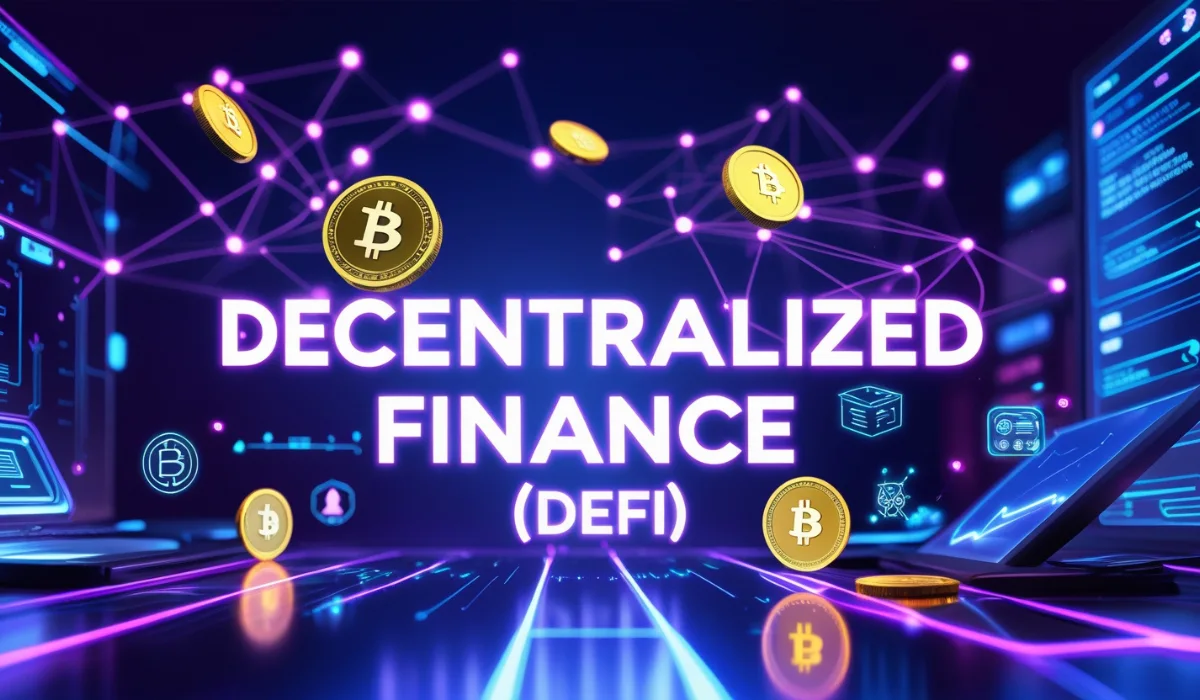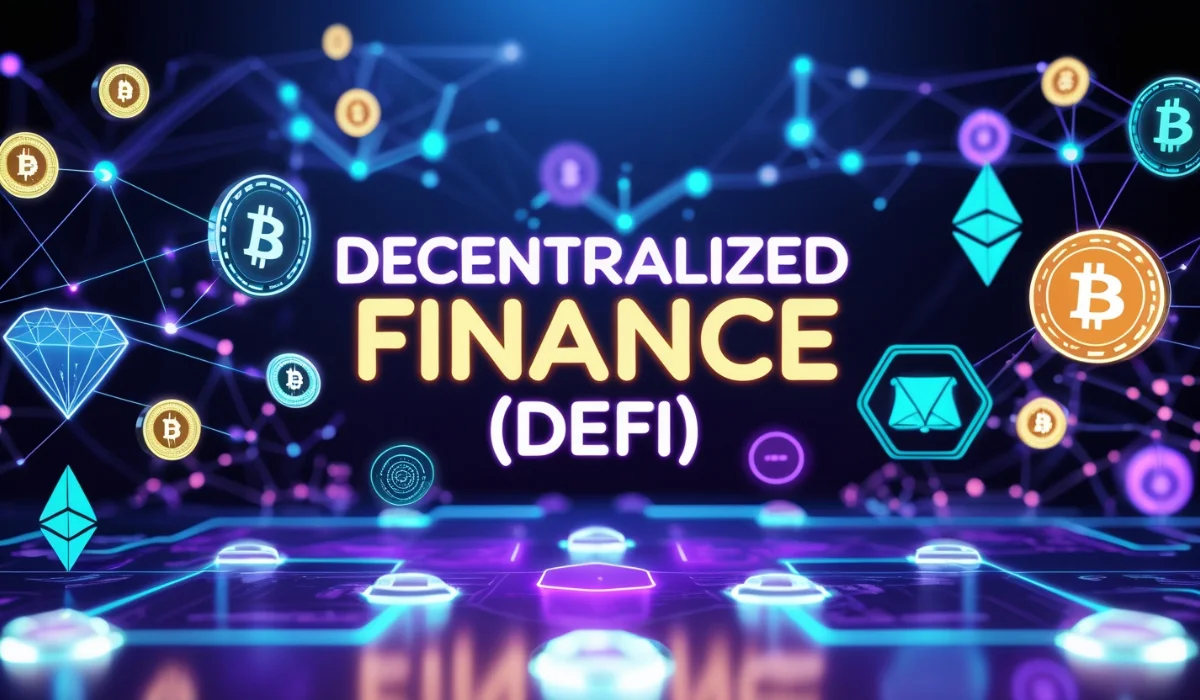Key Takeaways
- Decentralized Finance, generally known as DeFi, is a financial service system built using blockchain technology.
- DeFi eliminates the requirements of traditional intermediaries like banks and brokers from financial services using blockchain.
- In decentralized finance, users will have complete authority and more control over their assets.
- dApps, or decentralized applications, are the platforms that help users interact with decentralized finance.
The term decentralized finance (DeFi) can be an umbrella term that can be applied to all financial services on the public blockchains. The major components of DeFi are blockchain technology and cryptocurrencies.
DeFi uses both these technologies to enable peer-to-peer transactions without the assistance of any centralized agencies like banks or brokers. The basic principle behind DeFi is making the financial system efficient and faster by removing third parties.
Reduced transaction costs are another important aspect that forces people to select DeFi over traditional finance. This article explains the concept of decentralized finance and how it works.
What is Decentralized Finance (DeFi)
Decentralized finance generally refers DeFi, is an emerging financial system that enables peer-to-peer transactions using blockchain technology and cryptocurrencies.
This financial system allows people, businesses, and other organizations to transact directly with each other without the intervention of third-party intermediaries like banks or brokers.
The elimination of third parties like banks reduces the transaction costs and times, and the reduced transaction time and cost attract more users and force them to choose DeFi over the traditional financial system.
DeFi uses smart contract algorithms to automate financial processes on the blockchain network. Smart contract algorithms fulfill the role of centralized agencies in DeFi, and by enabling self-executing contracts based on pre-defined rules, DeFi removes the requirement of centralized authorities and ensures transparency in the transactions.
Smart contracts can connect lenders and borrowers, determine interest rates, and decide loan agreements, etc.
The authority and responsibility in the DeFi approach will be distributed among the individuals who participate in it. The peer-to-peer approach gives more autonomy to the users, and they can control the transactions by validating the distributed ledger and using their private cryptographic keys.
The tool or application that is responsible for providing financial services on a decentralized network is called a decentralized application (dApp).
How does Decentralized Finance Work?

The working principles of decentralized finance can only be explained by considering three core factors, which are blockchain technology, smart contracts, and decentralized applications (dApps).
DeFi leverages blockchain technology and smart contract algorithms to facilitate and execute peer-to-peer transactions without the assistance of centralized institutions. DeFi uses dApps to provide its financial services, like lending, borrowing, and trading.
Decentralized finance uses blockchain technology, an immutable distributed ledger that is capable of recording all transactions securely and transparently. Anyone who uses DeFi services at any time can access the transaction details in the DeFi because they are publicly accessible and transparent.
Certain smart contract algorithms will be coded on the blockchain, and they can automate financial services when certain conditions mentioned in the coded agreements are met.
Smart contract technology can perform the same tasks quickly and efficiently that centralized agencies like banks and brokers are good at in centralized finance.
dApps are open-source and transparent applications that implement DeFi services. Users need certain dApps to interact with the DeFi services and perform tasks like lending, borrowing, etc.
Decentralized exchanges (DEX) are a type of dApp that mainly focuses on trading. DEX allows users to trade and swap different cryptocurrencies directly with each other without any guidance or supervision from centralized agencies.
DApps are the tools that shape decentralized finance into its concrete shape and make the financial system work effectively.
Also Read: How to Use a Crypto Hardware Wallet: A Step-by-Step Guide
Pros of Decentralized Finance
Decentralized finance offers a wide range of advantages and pros, including global accessibility, transparency, reduced costs, complete authority over the funds, etc. Here are some pros that make DeFi unique and universal.
1. Global accessibility: DeFi platforms and services are globally accessible, and anyone who has internet connectivity and a crypto wallet can access DeFi services from any location. The limitations regarding geographical boundaries in centralized finance can be solved by decentralized finance.
2. Inclusivity: Inclusivity is a notable advantage of DeFi; there are still people who don’t have access to centralized financial institutions and banking. DeFi can be an optional alternative for those underserved.
3. Transparency: All the transactions executed in decentralized finance will be recorded on the blockchain. The transaction details are open and publicly available, so everyone can verify and cross-check the transaction details. These provisions maintain transparency in the DeFi and attract more users who claim that transparency should be a top priority in financial systems.
4. Lower Costs: Decentralized finance has a lower fee structure compared to centralized finance. The reason for this reduced fee structure is the absence of centralized agencies like banks. The absence of intermediaries makes the decentralized financial services less expensive.
5. Self-Custody of funds: DeFi allows users to have complete control over their assets by leveraging non-custodial wallets. In centralized finance, users’ assets are usually managed and controlled by a third party, whereas it comes to DeFi, you can control your assets by yourself.
Cons of Decentralized Finance
Even though DeFi has so many advantages and special features, like all things, it too has some disadvantages or cons that pose a challenge to the users. The major challenges of DeFi are given below.
1. Technical complexity: Complexity in DeFi is one of the biggest challenges users face. DeFi possesses so many technical factors, like smart contracts, the lack of knowledge, and its features will create difficulty among users to use decentralized financial services.
2. Lack of proper customer service: DeFi doesn’t have a central authority to lead and control its total functioning, so there will be no one to contact to ask for help. This lack of customer service provisions is a key challenge that DeFi users face.
3. Security attacks and online threats: Decentralized finance works online, so it will be subject to online threats and cyber attacks. A lot of DeFi platforms have recently faced a lot of cyberattacks, so security concerns are a notable challenge of DeFi.
4. Scalability issues: Blockchains might be slow and face scalability issues during peak periods, which can be a concern for DeFi users, and it can hinder the wider adoption of DeFi and making it difficult and inconvenient to deal with.
5. Uncertainty in regulatory compliance: DeFi is still unregulated in most countries, and this lack of proper regulatory guidance can cause uncertainty in the sphere; it could seriously affect DeFi’s future development as well.
The Bottom Line
Decentralized finance is an emerging concept that is capable of replacing the traditional financial system, where centralized authorities control and regulate users’ assets. The system is still in its budding phase, and it needs to face many challenges to create its own space in human civilization.
Issues like bankruptcy cannot be seen in decentralized finance since there are no centralized financial agencies involved, but the security concerns related to online hacking and cyber attacks are realistic when it comes to DeFi.
In the future, users will find the centralized finance system as a slow-paced structure, and the importance of faster and cheaper systems like DeFi will increase.
A complete elimination of the centralized financial system is a distant possibility; what we need is the combined working of both centralized and decentralized finance for the betterment of human life.




